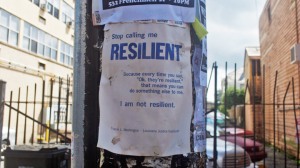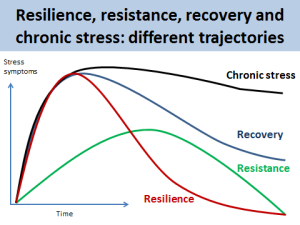Carole Adamson
“When I use a word,” Humpty Dumpty said in rather a scornful tone, ‘it means just what I choose it to mean — neither more nor less.”
“The question is,” said Alice, “whether you can make words mean so many different things.”
“The question is,” said Humpty Dumpty, “which is to be master— that’s all.”
“Through the Looking Glass” by Lewis Carroll
 A guest post by Carole Adamson
A guest post by Carole Adamson
I am writing this piece in response to a concern that as a frequently used (and perhaps over-used) concept, ‘resilience’ is still a relatively vague term that is in danger of being watered down or captured by agendas antithetical to social work’s allegiance to social justice and human rights.
Resilience is a generational buzz-word, utilised equally to describe whole communities after earthquakes, organisations going through structural change and families facing adversity through domestic violence, poverty or forced re-location. Indeed, the concept of resilience demonstrates its evolution and adaptation over time (Bottrell, 2009), from the influence of psychology and personality theories through to systems thinking and into a constructivist era, by defining resilience first as a capacity that rests within an individual; expanding this to include relational and systemic dimensions of family and wider social context; and through to current perspectives that embrace notions of hidden strengths (Ungar, 2004) and socio-cultural interpretations (Ungar, 2008).
Social work has embraced the concept with fervour, reinforcing our strengths perspective, client-focused emancipatory practice, narrative approaches and the inclusion of indigenous world views. But I wonder if we use it a bit like ‘trauma’ or ‘strengths’, or as I have written about elsewhere, ‘supervision’ (Adamson, 2011), terms that have the potential to be so generalised or captured by ideological agendas that they lose whatever specificity or potency they may have had? How do we resist the concept becoming a one-size-fits-all comfort blanket that we all want to snuggle beneath?
The issue for me is not so much the reining in the meaning and use of the concept but the recognition of how it has morphed according to the purposes for which it is used, and how it can be captured and utilised by various agendas. As Humpty Dumpty says, the key to the meaning of any concept that we use is who uses it – if we define resilience just as the ability to withstand adversity, it does nothing to address the causes of the adversity in the first place. It may instead focus upon the ability (or the responsibility) of the individual to accommodate the adversity, and may reflect a neoliberal agenda of focusing on the capacities and compliance of individuals (clients, families, workers, communities and indigenous peoples) to accept a status quo of inadequate resourcing, inequitable conditions and political agendas that work against long-term wellbeing.
Photo Source: http://candychang.com/resilient/
So how do we use it best in social work? We have to recognise that it is a relational, contextually-dependent and fluid concept. Its use is best optimised (I won’t use the Mr Dumpty’s suggestion that we ‘master’ words, he was a bit of an ‘egg’ when it comes to using gender-free language) through recognising social work’s core identity as a discipline and profession that spans micro and macro knowledge. We have a knowledge bias, as Payne suggested in 2001, from within which we can read the concept of resilience. Current research indicates that resilience is not uni-dimensional, neither in its origins nor in how we promote and sustain it (e.g. Bonanno, Westphal & Mancini, 2011): rather, there are multiple independent predictors of positive outcome that can entrench the concept within social work’s comprehension of complexity.
Resilience is not the product of a simple equation and we are enabled by the way we interpret wellbeing and positive outcomes to acknowledge that the demonstration of resilience is but one pathway of response out of adversity. I like the way in which Norris, Tracy and Galea (2009) chart pathways of recovery from stressful experience: describing resilience as a trajectory, they define it as demonstrating a sharp decrease after initially high stress reactions, in contrast to resistance (low and stable levels of symptoms), recovery (a slower decline of symptoms) and chronic stress responses.
Source: Norris, Tracy and Galea (2009)
Unpacking the concept like this allows for recognition that interventions in support of resilience cannot be a formulaic, one-size-fits-all process. New Zealand social work research too points to resilience formed out of a multiplicity of individual, relational and contextual factors. In our research with experienced social workers and practice learning supervisors (Adamson, Beddoe & Davys, 2012), a matrix of factors contributing toward practitioner resilience was identified, suggesting again that a social work knowledge bias, incorporating individual, systemic and constructivist perspectives, strongly supports current definitions of resilience.
My argument is that by asserting the authenticity and viability of our social work perspective, we can combat the distortion and the de-contextualisation of the concept of resilience without losing its utility for strengths-based and structurally-informed practice.
References
Adamson, C. (2011). Supervision is not politically innocent. Australian Social Work, 65(2), 185-196. E-print link here
Adamson, C., Beddoe, L., & Davys, A. (2012). Building resilient practitioners: Definitions and practitioner understandings. British Journal of Social Work, 32(1), 100-117. 10.1093/bjsw/bcs142 Abstract here.
Beddoe, L., Davys, A. M., & Adamson, C. (2014). ‘Never Trust Anybody Who Says “I Don’t Need Supervision”’: Practitioners’ Beliefs about Social Worker Resilience. Practice, 26(2), 113-130. Read here
Bonanno, G. A., Westphal, M. & Mancini, A.D. (2011). Resilience to loss and potential trauma. Annual Review of Clinical Psychology, 7(1), 511-535. 10.1146/annurev-clinpsy-032210-104526
Bottrell, D. (2009). Understanding ‘marginal’ perspectives: Towards a social theory of resilience. Qualitative Social Work, 8(3), 321-339. 10.1177/1473325009337840
Norris, F. H., Tracy, M., & Galea, S. (2009). Looking for resilience: Understanding the longitudinal trajectories of responses to stress. Social Science & Medicine, 68(12), 2190-2198. 10.1016/j.socscimed.2009.03.043
Payne, M. (2001). Knowledge bases and knowledge biases in social work. Journal of Social Work, 1(2), 133-136. 10.1177/146801730100100202
Ungar, M. (2004). Nurturing Hidden Resilience in Troubled Youth. Toronto: University of Toronto Press.
Ungar, M. (2008). Resilience across cultures. British Journal of Social Work, 38(2), 218-235. 10.1093/bjsw/bcl343



Yee ha, that was quick. Thanks for that – go for the tweet!
I am a PhD research candidate in Scotland (and a social worker) my research is in the area you describe specifically on resilience, dementia and social work practice. I am considering the meaning(s) of resilience and applicability for people with dementia. I am also considering if/how social workers use this concept when working with people who have dementia. I agree with you about the overuse of the term and issues around definition. It’s a very interesting area.
I am really interested in your article . I have been wondering for a while about the widespread and uncritical use of the word ‘resilience’. It seems to be replacing ’empower’ – another word which can perhaps also be employed to justify withdrawing services whilst sounding very much on the side of service users. Unlike ’empower’ however, ‘resilience’ seems to be fashionable well beyond social work – my husband for example talks about its equal prevalence within conservation science. I wonder if this points to its link to our current political moment, which, as you say, feels important to be aware of.
Kia Ora Rachael. Yes, you make some good points. I’m currently looking at disaster knowledge bases for social work and the debates about what is meant by ‘community resilience’ are just as complex – my personal assumption is that we are still testing out the relationship between positivist and complex ways of understanding, but agencies and state organizations charged with making interventions must evaluate only through positivist measurement processes that reveal cause and effect and accountable returns on investment. So ‘resilience’ becomes a measure of how much the State needs to be involved… Which is a very narrow, (mis)appropriated use of the term. Watch this space, I reckon ‘sustainable’ is going the same way.